 Petzlover
Petzlover Bohemian Shepherd is originated from Czech Republic but Tsvetnaya Bolonka is originated from Russia. Bohemian Shepherd may grow 29 cm / 12 inches higher than Tsvetnaya Bolonka. Bohemian Shepherd may weigh 21 kg / 47 pounds more than Tsvetnaya Bolonka. Bohemian Shepherd may live 3 years less than Tsvetnaya Bolonka. Bohemian Shepherd may have more litter size than Tsvetnaya Bolonka. Both Bohemian Shepherd and Tsvetnaya Bolonka requires Moderate Maintenance.
Bohemian Shepherd is originated from Czech Republic but Tsvetnaya Bolonka is originated from Russia. Bohemian Shepherd may grow 29 cm / 12 inches higher than Tsvetnaya Bolonka. Bohemian Shepherd may weigh 21 kg / 47 pounds more than Tsvetnaya Bolonka. Bohemian Shepherd may live 3 years less than Tsvetnaya Bolonka. Bohemian Shepherd may have more litter size than Tsvetnaya Bolonka. Both Bohemian Shepherd and Tsvetnaya Bolonka requires Moderate Maintenance.
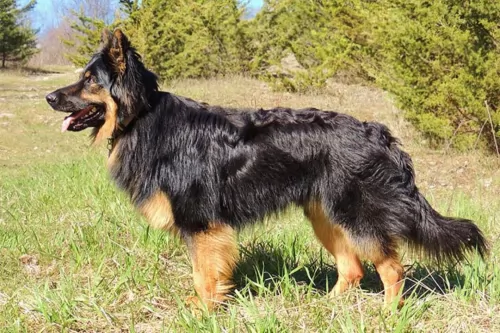 Known as the Chodský pes or the Chodenhund, the Bohemian Shepherd is native to the Czech Republic and is a herding breed. Like many other old dog breeds, nothing is 100% certain about is history. This is thought to be because the breed was developed centuries before the keeping of records. It is certain however, that the breed developed in the south-western portion of the Kingdom of Bohemia, which is now part of the Czech Republic.
Known as the Chodský pes or the Chodenhund, the Bohemian Shepherd is native to the Czech Republic and is a herding breed. Like many other old dog breeds, nothing is 100% certain about is history. This is thought to be because the breed was developed centuries before the keeping of records. It is certain however, that the breed developed in the south-western portion of the Kingdom of Bohemia, which is now part of the Czech Republic.
It is believed the Bohemian Shepherd came from herding dogs such as the Pinscher/Schnauzer, Spitzen or even a dog/wolf hybrid. It was in November 1991, that the Bohemian Shepherd Lover’s Club was founded. Many Bohemian Shepherd breeders have been registered and today the breed has earned the reputation for being a superb family dog. The dog has also been granted recognition with the Czech National Kennel Club.
 It is believed that the dog’s ancestors are the Toy Poodle, Pekingnese, Bichon Frise and Shih Tzu. The Russian Tsvetnaya Bolonka has also become more well known since the British royal couple, Willam and Kate, have them as pets.
It is believed that the dog’s ancestors are the Toy Poodle, Pekingnese, Bichon Frise and Shih Tzu. The Russian Tsvetnaya Bolonka has also become more well known since the British royal couple, Willam and Kate, have them as pets.
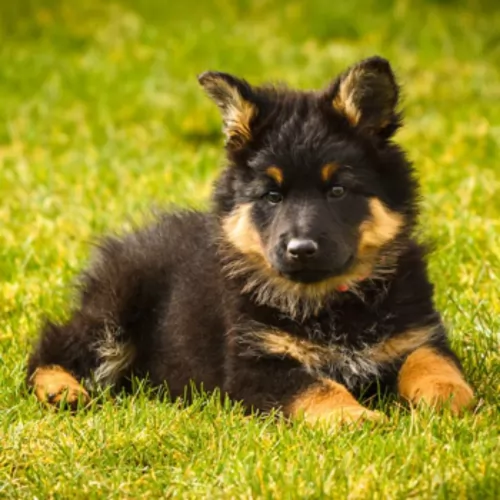 The medium sized Bohemian Shepherd looks much like a combination between the Collie and German Shepherd. He is 48-55 cm in height and weighs about 15-25 kg. The Bohemian Shepherd has a thick, long coat which is black and tan in color and with an undercoat, allowing him to cope in icy weather conditions. His well proportioned body is muscular and compact with a long bushy tail and erect ears.
The medium sized Bohemian Shepherd looks much like a combination between the Collie and German Shepherd. He is 48-55 cm in height and weighs about 15-25 kg. The Bohemian Shepherd has a thick, long coat which is black and tan in color and with an undercoat, allowing him to cope in icy weather conditions. His well proportioned body is muscular and compact with a long bushy tail and erect ears.
The Bohemian Shepherd makes a wonderful family pet, becoming very attached to his human family. He has a good reputation with children too and will get on well with other pets in the home. He is so amicable that he makes a good pet choice for those looking to own a dog for the first time.
He is intelligent and alert and also protective of his family, making him an excellent guard dog. He is easily trainable, and just like with any other dogs, will require training and socialization.
 The Tsvetnaya Bolonka is a small dog standing at 22 – 27cm in height and weighing between 2 and 4kg. He has been developed to be a companion dog.
The Tsvetnaya Bolonka is a small dog standing at 22 – 27cm in height and weighing between 2 and 4kg. He has been developed to be a companion dog.
The long coat of the dog is wavy or curly and is a grey color, brown, red, white or black. The males have a beard and mustache.
Allergy sufferers appreciate that the dog doesn’t shed but the coat will need to be brushed to prevent matting. The ears are medium length and the tail curls up over the back.
These dogs are sturdy, happy, social, playful little dogs with a loving, loyal temperament. They’re balls of fun and make super playmates of disciplined children who have been taught to be kind and gentle with animals.
They are well balanced, amicable dogs with a streak of independence. They’re intelligent too and will respond well to training and socialization.
He isn’t aggressive and isn’t a yapper either. He is a friendly dog, even with strangers but he can still prove to be a good watchdog. Small and compact, he can do well in the countryside or the city.
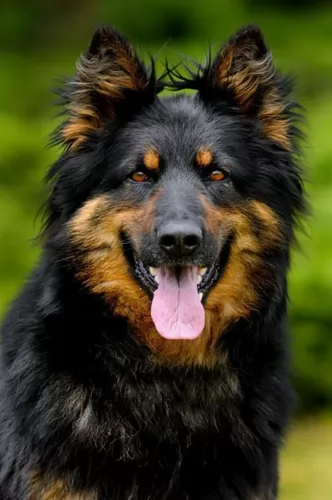 Playful by nature, friendly, gentle and co-operative, your Bohemian Shepherd will make a wonderful pet and he is a real social character, loving to spend lots of time with his human family. With minimal health conditions and without requiring much maintenance, he is an adaptable dog and will easily settle into city- or country living, so long as he is given regular exercise and attention.
Playful by nature, friendly, gentle and co-operative, your Bohemian Shepherd will make a wonderful pet and he is a real social character, loving to spend lots of time with his human family. With minimal health conditions and without requiring much maintenance, he is an adaptable dog and will easily settle into city- or country living, so long as he is given regular exercise and attention.
He is courageous and intelligent and also makes an excellent guard-dog. With so much going for this beautiful dog, he simply makes a loyal, loving and devoted family pet.
 The Tsvetnaya Bolonka is a true companion being even-tempered, intelligent and friendly. He has been specifically developed as a companion dog whether you live in the city or the countryside.
The Tsvetnaya Bolonka is a true companion being even-tempered, intelligent and friendly. He has been specifically developed as a companion dog whether you live in the city or the countryside.
He gets on well with children and with other pets in the home and even towards strangers. Just remember that wherever you choose to live with your sweet little pet, he will still need regular exercise to remain the feisty, happy little dog he is.
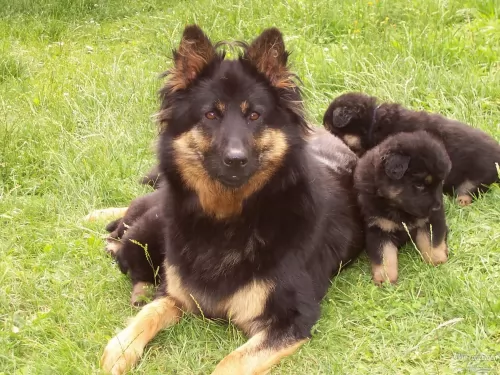 Breeding organizations are continually trying to minimize the diseases within limited-gene-pool dog breeds. While the Bohemian Shepherd is a generally health breed, there are diseases that are more common with the Bohemian Shepherd and which you need to be aware of -
Breeding organizations are continually trying to minimize the diseases within limited-gene-pool dog breeds. While the Bohemian Shepherd is a generally health breed, there are diseases that are more common with the Bohemian Shepherd and which you need to be aware of -
This is a painful disease – a problem with the formation of the hips – where the dog can develop arthritis and even become lame.
This is a condition where gas gets trapped in the stomach of your pet, so that he swells up, sometimes causing the stomach to twist. This is an emergency for your pet and it is extremely painful. Nobody really knows the cause, but when the gas is trapped inside the stomach, the bloated stomach of your pet requires you getting to the vet as quickly as you can.
Look out for Progressive Retinal Atrophy known as PRA . This is a group of degenerative diseases that affect the photoreceptor cells where the cells deteriorate and can result in blindness with your pet. Fortunately it isn’t a painful condition.
 This breed may get some of the typical small-dog health conditions. These can be things such as dental problems, obesity and Patellar Luxation.
This breed may get some of the typical small-dog health conditions. These can be things such as dental problems, obesity and Patellar Luxation.
Small dogs often have problems with their knees, and patellar luxation is a common orthopedic condition for small dogs. You’ll see your dog walking on 3 legs.
A luxated kneecap can move out of place, but in some more serious instances, it can dislocate completely. Treatment will require a visit to the vet. Sometimes surgery is required.
Small dogs are more prone to dental disease than large dogs. Tartar and plaque form, there is gum recession, and loss of teeth is common with these little dogs.
Check inside his mouth regularly. Brushing the teeth can be of value to the dog and you get special canine dog and toothpaste. A tooth infection can be serious for your pet and cause him to have toxins circulating in the bloodstream that can make him sick.
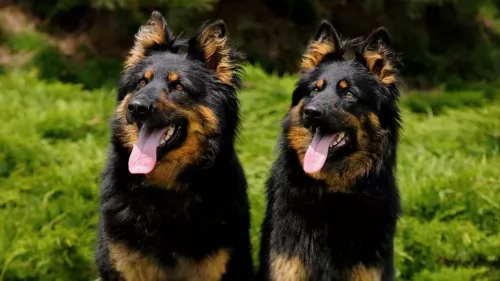 The Bohemian Shepherd is an energetic breed and will need to be exercised regularly. He’ll love to run alongside your bike on your cycling trips or you can take him on a long walk. Having said that, he is an easy going dog and can adapt to city- and country life, but if it’s city life, you can’t leave him cooped up in a small yard and think that will suffice. He has a personality that longs to be part of the family.
The Bohemian Shepherd is an energetic breed and will need to be exercised regularly. He’ll love to run alongside your bike on your cycling trips or you can take him on a long walk. Having said that, he is an easy going dog and can adapt to city- and country life, but if it’s city life, you can’t leave him cooped up in a small yard and think that will suffice. He has a personality that longs to be part of the family.
Your Bohemian Shepherd is a moderate shedder in spite of his thick beautiful coat. The coat will certainly need a good brushing at least twice a week to get rid of that loose hair. Not only that, your social Bohemian Shepherd will love the closeness to you that the brushing brings.
Keep his nails short and his teeth brushed at least 2 or 3 times a week to ensure there is no plaque build up. There are special toothbrushes and toothpastes made for dogs. Don’t use human toothpaste as the ingredients will be harmful to your pet.
Your Bohemian Shepherd, after one year of age, will eat one or two bowls of food a day. You’ll be able to tell what suits your dog, because the amount will eat about 2 to 4 cups of a good quality dry dog food a day, split into at least two meals. The amount can vary depending on its health, build, age, activity level and metabolism. Make sure it has access to water at all times and that it is changed as often as possible.
 These little dogs will need a walk each day. They also love all sorts of games both indoors and outside.
These little dogs will need a walk each day. They also love all sorts of games both indoors and outside.
Brush the hair regularly to avoid matting. Many people tie the hair around the face into a ponytail. If the hair becomes dirty, it can be gently shampooed with a mild, natural shampoo and conditioned. The wet hair will require a wide-tooth comb to comb the hair.
Feed your dog the best dry kibble that there is. Check the packaging and make sure the ingredients are the best, full of vitamins and minerals. Try to give him some tasty home-made food such as boiled chicken, brown rice and vegetables. Remember to chop it up very finely. Never give your dog foods such as chocolate, popcorn, peanuts, and spicy food. It can upset his stomach. Make sure he has constant access to fresh, cool water.
Get your little pet to the vet if he shows signs of illness and make sure his vaccines are up to date to avoid deadly canine illnesses.